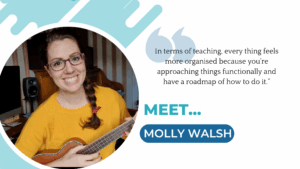Here are three valuable pieces of advice about being a singing teacher that will help you through tough days in the studio.
⏱ 2 Minute Read
Have you ever felt the creeping shadow of imposter syndrome looming over you in singing lessons?
If so, you’re not alone.
Being a singing teacher can, at times, be a lonely endeavour, peppered with feelings of self-doubt or loneliness.
Someone who knows what it’s like is Alexa Terry, who has been teaching for eight years.
On the Singing Teachers Talk podcast, Alexa revealed some of the most valuable lessons she’s learned on her singing teaching journey thus far. Here are a few of her findings.
Sometimes there’s no one right answer
There’s no perfect formula for diagnosing voice problems or providing technical advice.
The singing community doesn’t even agree on terminology (for example, one teacher’s ‘head voice’ is another’s ‘upper register’).
That means that the more you learn about the voice, the more you’ll come across different, conflicting viewpoints.
“You’re going to come across many contradicting opinions as you try to navigate being a singing teacher,” Alexa says.
“And that’s okay. It is confusing, frustrating and something you must accept. Otherwise, you’ll drive yourself bonkers.
“You’re going to need to develop the skill to understand the premise of each rationale.”
Take, for example, belt; a popular vocal quality that most contemporary singers want to master.
Well, we say vocal quality, but others would beg to differ.
“Some pedagogues believe belt is a register, others define it as a voice quality. And some believe it is both,” Alexa says.
“I have learned to just keep reading, keep absorbing and keep learning and it will help me to make informed decisions of my own.”
Know who your people are
If you run a private singing studio, you won’t be surrounded by colleagues whom you can nudge for advice or feedback.
But that doesn’t mean you have to figure everything out by yourself.
“Being a one-to-one singing teacher can be a really lonely place at times, and it may feel like you have no one to bounce ideas off,” Alexa says.
“But the truth is, you do because you’ll find your people. Whether that’s through a community like BAST, a course that you attend, or through colleagues that you meet at events or institutions that you work at, reach out to them and ask your questions.
“It might prompt a really fun discussion that just brings you and bonds you all together.”
Breakthroughs aren’t going to happen every single lesson
When a student finally nails a challenging technical skill, you’ll feel elated (and that your hard work is paying off).
But no matter how amazing you are as a teacher, that’s not going to happen all the time.
“It would be a wonderful full-body ego massage for there to be breakthrough after breakthrough after breakthrough each and every lesson,” Alexa says.
“But as a fellow singing teacher said to me recently, ‘sometimes we just have to tread water for a while and let an idea simmer’.
“Just because there was no earth-moving discovery, doesn’t mean big shifts weren’t happening.
“I remember one session where I thought I had done a really poor job. Then the student messaged me the following day to say something along the lines of ‘yesterday’s lesson was so great, I really started to get to grips with that particular thing we were working on.’
“Sometimes success and progress are as silent as the season’s turning.”
Learn more
Listen to this episode of the podcast to hear Alexa’s full list of important singing teaching lessons (there are eight in total).
She also speaks about her journey from bored office worker to teaching at a top theatre school.




